#or maybe i AM the dragon
Explore tagged Tumblr posts
Text
“That ship is toxic ! They're so unhealthy—”


#loustat#please don't look at my ao3 tabs you'll be traumatized#devils minion#amc interview with the vampire#interview with the vampire#jegulus#rosekiller#hannigram#Hannibal#wolfstar#maybe young wolfstar idk i am chewing#ghoap#lestat de lioncourt#patrochilles#and it's their unhealthy obsession#will graham#louis de pointe du lac#armand#daniel molloy#jjk#drarry#dramoine#harry potter#rhaenicent#house of the dragon#marvel#the magnus archives#folkloregurl fics🪩
6K notes
·
View notes
Text

Dressing the blorbo up just because. 🫢
#dragon age#dragon age the veilguard#DAtV#Emmrich volkarin#my art#this is what happens when I stare at photoshoots#also just having a fave and dressing em up in all sorts#it’s fun heheh#suit Emmy suit Emmy#i am so so tired#exhausted brain doodle tonight that I may regret in the morning#maybe#oh Emmy
2K notes
·
View notes
Text


Long distance besties. This definitely happened after the third movie (source: trust me bro)
Based on this
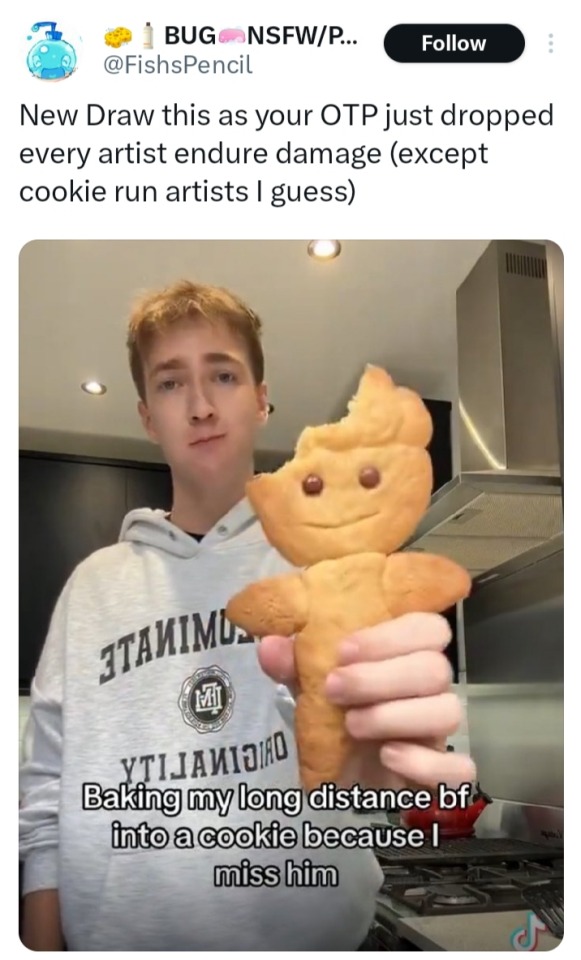
#anyways time to yap in the tags 😋☝️#but first ummmm lemme just tag some shit#how to train your dragon#httyd#httyd hiccup#hiccup haddock#hiccup horrendous haddock iii#toothless#httyd toothless#ok i think that its done#anyways this definitely happaned after the dragons left like just trust me bro 🙏🙏🙏🙏#omfg i wanted to make this with hijack as well cause lol. do you get it. they're long distance LOLOLOL#maybe i will make it who knows. is it weird to make the same art trend with different characters??#OH WAIT FORGOT ANOTHER TAG#hicctooth#is this the duo name for them#or is it called#hictooth#doesnt matter. what matters is that theyre literally the definition of platonic soulmates bro#like wtf i love them#sorry for making them look miserable i didnt meant for them to look lile that 😭😭😭😭#omg with that being said#BROOOOOO I AM NOT GONNA DRAW DRAGONS ANYMORE IM DONEEEEE HOW DO YOU DRAW DRAGONS 😭😭😭😭😭🙏🙏#anyways first attempt do you like it. SAY YES RIGHT NOW#if you read this much till the end you need to kiss me rn muah muah muah#also say i did a good job at making them look like cookies like#say it rn#okie bye byeeeeee#I FORGOT TO ADD HIS BRAID IM GONNA KMSSSSSS NOOOOOOOOOOOOOOOO#omg i failed
3K notes
·
View notes
Text
if I see one more post about Aegon “bullying Aemond his entire life”, I will go fucking ballistic, I swear to g—
scratch that, I will actually go ballistic right now. this is the “Aegon doesn’t deserve such a shitty treatment” club and I’m the self-proclaimed CEO. we are about to do some analyzing and reading so BUCKLE UP.
gonna make one thing clear first — Aemond was bullied when he was a child. no one denies that, no excuses can be made for that. I’d only like to note that there wasn’t only one bully. here’s a quick reminder:
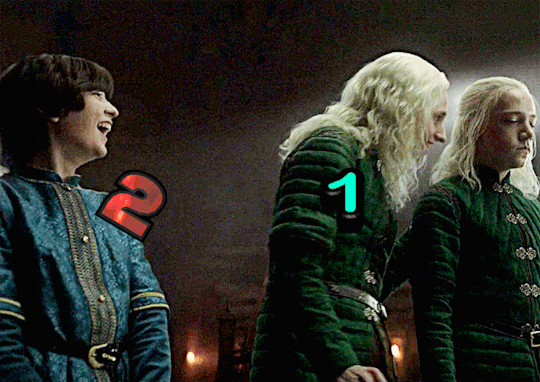

now that we successfully counted to three, let’s look over Aegon’s other horrible crimes relationship with Aemond throughout the years.
📍 the night Aemond lost his eye (S1EP7), Rhaenyra suggests he should be “sharply questioned” (she means tortured) so they can learn who told him that her sons were bastards. Viserys, in his perpetual denial, angrily asks Aemond “who spoke these lies” to which he replies that it was Aegon. it is clear that Aemond does that to deflect suspicion from their mother but his words come as a surprise to Aegon.
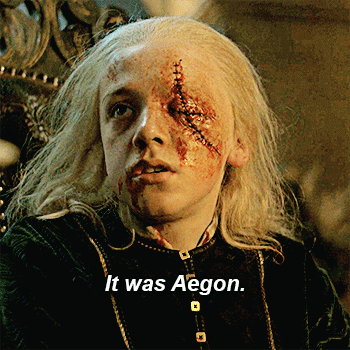

he’s in a tough spot — Viserys demands the answers “as their king”, not their father (to signify his authority and pressure them into telling the truth). and Alicent screamed in Aegon’s face and slapped him just a minute ago, so he may be less eager to defend her. he can easily lie and say that he overheard some maids gossiping or that he can’t remember where the rumor came from. instead, it takes Aegon about 5 seconds to back Aemond up.
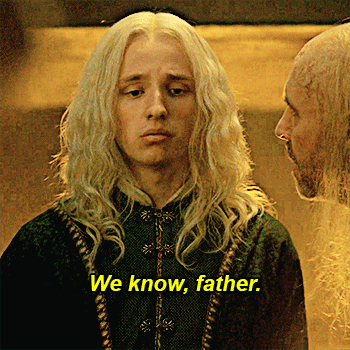


📍 we didn’t get many scenes with young Aegon and Aemond in general, but here’s a short bit people keep overlooking: when Harwin and Criston start fighting, Aemond and Aegon instantly gravitate toward each other. and moreover, Aegon puts a hand over Aemond’s back (which to me is either a protective or a comforting gesture). what a horrible brother, truly.
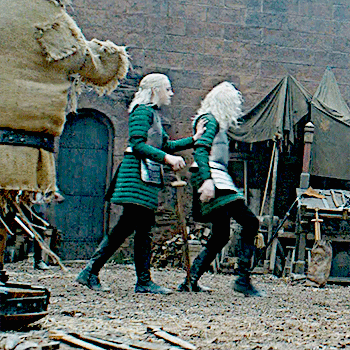
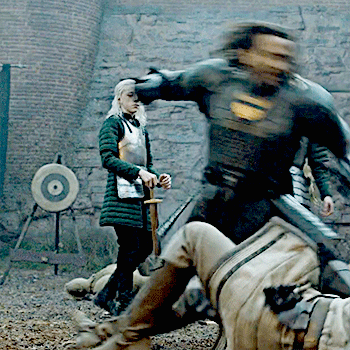
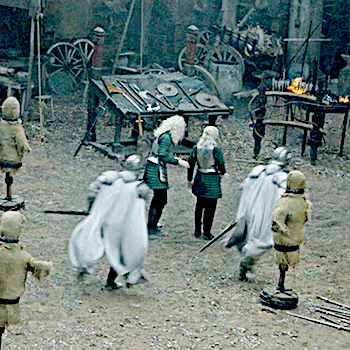
📍 next we see them all grown up before dinner in S1EP8. I think it’s safe to assume that if Aegon has been bullying Aemond all these years, Aemond wouldn’t want to spend a second in his company. he’s seated between Helaena and Otto, both of whom are dear to him, so Aemond can stay at the table and chat with them. and YET, not only does Aemond voluntarily talks to Aegon, but their conversation seems friendly (you can barely hear it in the show so here’s the enhanced audio). Aemond makes a joke about Aegon’s drinking habits — Aegon quips back — and then, what a shocker! Aemond starts venting his frustrations to Aegon (“Even when the noose is so tight, they expect us to break bread”). nothing would’ve stopped him from venting to Otto but Aemond stays with Aegon. he wouldn’t have done that if there hadn’t been some level of trust between them. he wouldn’t have done that if he hated Aegon’s guts.
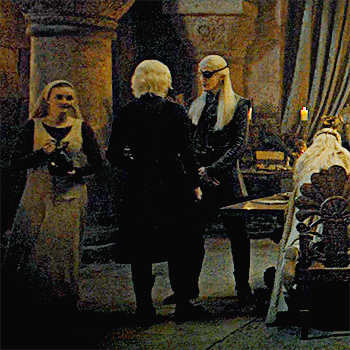
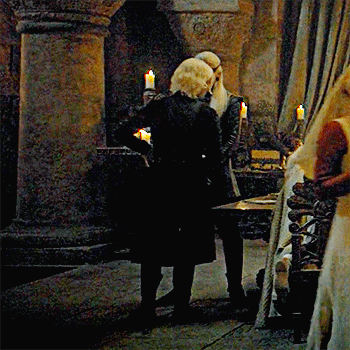
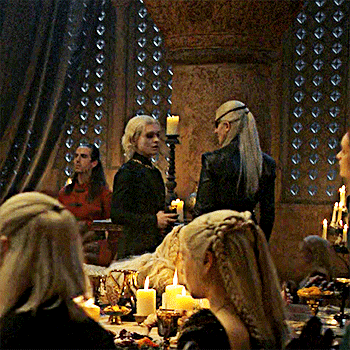
📍 at dinner, when Aegon pisses Jace off and the brunet springs to his feet, Aemond stands up too, which forces Jace to act as if nothing happened and come up with a toast. Aegon watches him with a shit-eating grin on his face. it’s the face that screams “I know you won’t dare to act up in front of my brother and my brother has my back”.
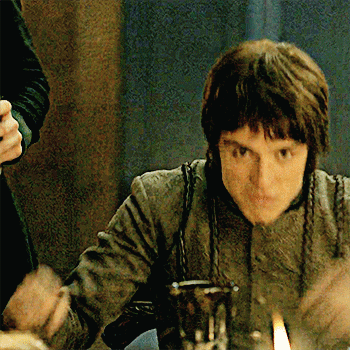
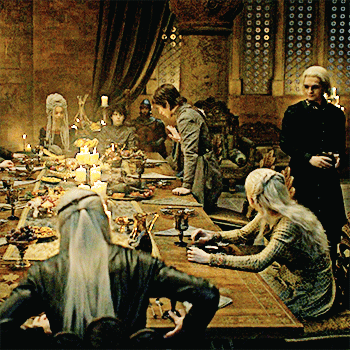
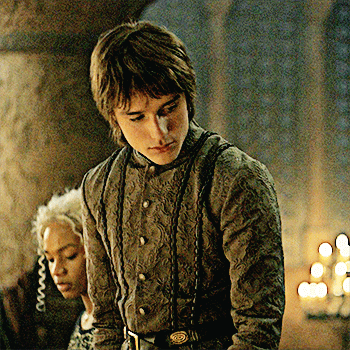

when Aemond makes a toast and calls Rhaenyra’s sons “strong”, Aegon raises a cup to that. he can sit this one out — Aemond has his personal vendetta against the boys, and it would be safer for Aegon not to meddle. but what does he do instead? when Luke gets up from the table (clearly intending to go to Aemond), Aegon instantly stands up, comes up to Luke and not just stops him but slams his face into the table right in front of Rhaenyra without thinking twice. and it doesn’t look like Aegon is just messing with him — no, it looks like he wanted to do that for a while. like Aegon finally got his chance to stand up for his brother too. AND he also stops Baela from joining the fight.
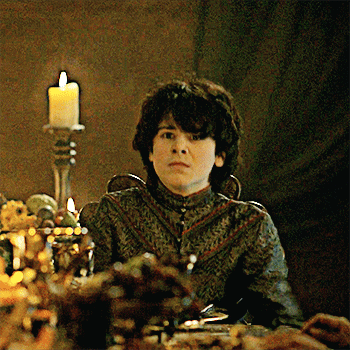
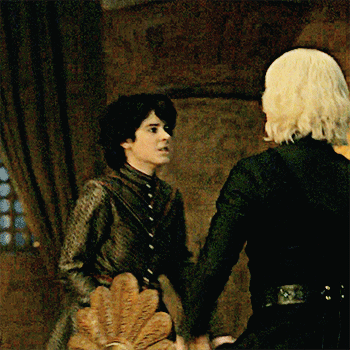
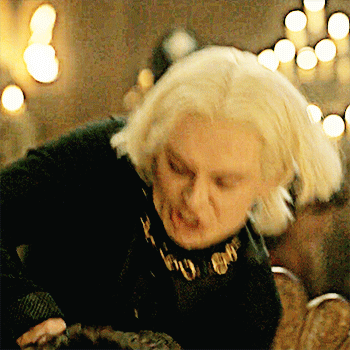
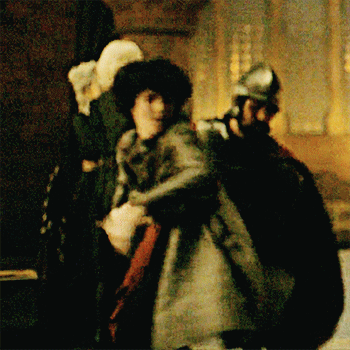
📍 S1EP9 is when we get a glimpse of Aemond’s ambitions: he deems himself better than Aegon, he thinks he deserves to be king. but once he finds Aegon and they get into a fight, it turns out that Aegon knows that Aemond is a better choice. he doesn’t want to fight him, he begs Aemond to let him go. and Aemond can do that — Criston has his back to them, so Aemond could’ve pretended that Aegon managed to break free. and even once they caught Aegon, I have no doubt that Aemond could’ve helped him escape. but it seems that, despite his displeasure, Aemond values his family the most. he can’t betray his mother’s trust, and he knows Aegon is the first in line to the throne. Aemond envies him, yes, he may even hate him because of that. but he values his family the most.
📍 as @florisbaratheons noted, during the coronation scene, when Aegon glances at his family, Aemond looks right at him and gives that tiny nod that says “I may hate this and think I am better for the job as king. But I’ve got your back.” I like that Aemond is the one who keeps eye contact in that scene. He could’ve turned away to signal his dissatisfaction with the situation, there wouldn’t have been any consequences for that. But he didn’t.
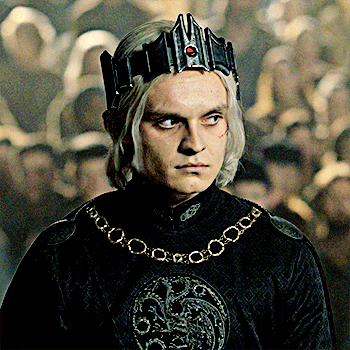
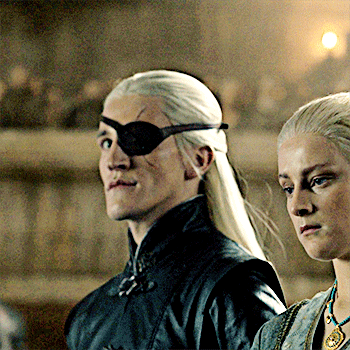
📍 what I find interesting about S1EP10 is the beginning of Aemond’s dialogue with Luke. that’s the boy Aemond wished to get back at for years and yet, he starts by saying “Did you think that you could just fly about the realm trying to steal my brother’s throne at no cost?”. Aemond could’ve skipped that part — imagine him saying smth along the lines of “Wait, Lord Strong! Don’t you think you and I have other matters to discuss?” (to which Luke answers that he doesn’t want to fight and the conversation goes on). instead, Aemond makes a point to remind Luke: my brother is the king, and I came here on his behalf. you can argue that Aemond doesn’t do it for Aegon specifically but for his family in general. but Aegon is a part of the family, and S1 Aemond has his priorities straight.
📍 as much as I hate comparing the show and the book (these are two different things and should be viewed as such), I’d like to remind you that Aegon was the only one who stood by Aemond’s side after Luke’s death. I wonder why we didn’t get that scene… I guess it’s because it would be kinda hard to call Aegon “the main bully” after he literally throws Aemond a feast. but we do get to see Aegon supporting his brother: in S2EP1 he welcomes Aemond at the small council meeting despite his mother’s protests (“Aemond is my closest blood and my best sword”). and he trusts Aemond wholeheartedly, that much is obvious.
📍 let’s get to the most controversial part — the brothel scene in S2EP3: some people believe Aegon is being a bully at that moment. those people seem to forget one little detail:
it’s been only a few days after the death of Aegon’s son whose murder was a direct result of Aemond’s ruthless actions. does Aemond ever address it? does he express his condolences? does he mayhaps help to catch the killers, being the skilled fighter that he is? the answer is NO.
I do think Aegon’s joke was cruel (I wrote a whole post about it) but that’s all it ever was — a JOKE. the humiliation comes not from the things he says but from the fact that Aemond is found in a vulnerable position and surrounded by a group of strangers while his brother laughs at him. TGC explained it best:
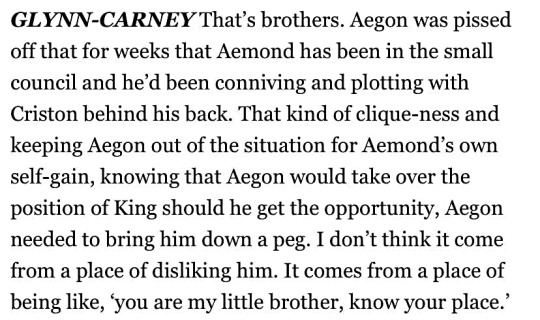
I also love @notbloodraven’s take on that scene:
Aegon lashing out so cruelly at Aemond seems to be an effort in making Aemond feel as badly as he does and blaming him for Jaehaerys without actually saying the words.
would this be the right way to act? no. but there’s no right way to grieve and to cope with the loss — and HIS SON WAS BEHEADED so maybe take 1% of the sympathy you show your favorite character(s) and cut Aegon some slack.
+ other things worth talking about:
📍 @bietrofastimoff23 analyzed S2EP3 beautifully and I can’t help but mention the scene that happens before Aegon goes to the brothel. it’s the moment when Larys suggests that Alicent and Aemond are plotting against Aegon. he isn’t surprised by the idea that his mother can do that — but the second his brother is mentioned, Aegon’s face falls and he shakes his head no. because there is no way Aemond would ever do that to him. and instead of asking for any proof, he asks Larys “who spreads these lies?” and then commands him to “tend to them.” Aegon can ask him to spy on Aemond, to find any dirt on him, find any weaknesses he can use — he does not.
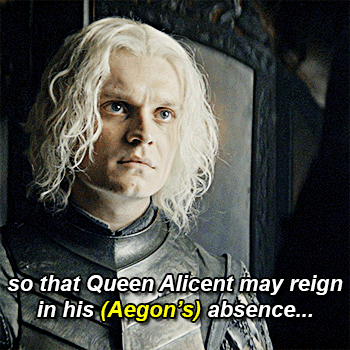
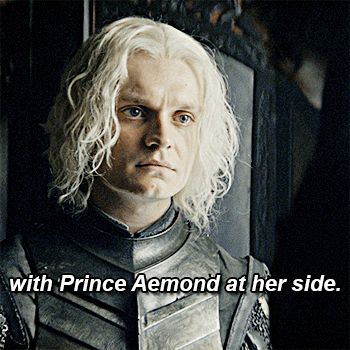
📍 it turns out to be true — Aemond was plotting behind his brother’s back. which is treason btw (I don’t think Criston intended to keep things from Aegon — he probably believed that Aemond would let Aegon in on their plan). and Aegon does have the power to remind Aemond of his place — he can throw him off the council with a snap of his fingers, he can take offense at Aemond’s attempt to publicly humiliate him (their conversation in High Valyrian — Ewan himself calls it a “public execution”). but that’s not what happens: as TGC phrased it, Aemond’s betrayal “breaks a bit of Aegon’s heart off”. an actual bully would’ve immediately pushed back, but Aegon silently sits down and doesn’t argue, he’s so defeated he can’t utter a word. he has the means to be a bully but he doesn’t contemplate it for a second.
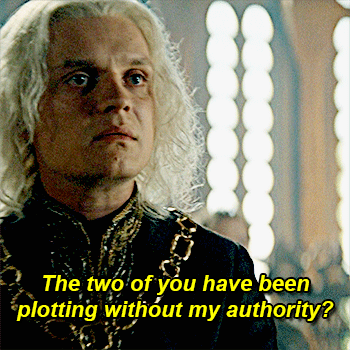
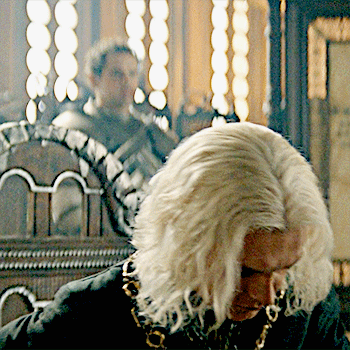
📍 I don’t want to talk about S2EP6 because it makes me sick but I will reiterate one thing: never ONCE Aegon made fun of Aemond’s disability or tried to cause him any physical harm. just want to point that out.
there is no moral to this story, I guess. if you managed to read till the very end, thank you. if you still hate Aegon, that’s your opinion and you are allowed to have one — but please, for the love of god, just stop making shit up. no, Aemond was NOT bullied as an adult, absolutely nothing suggests that he was. Aegon was naive to blindly trust him and it backfired on him, that’s the actual story. and if you are so eager to hold Aegon accountable for his mistakes, maybe it’s time for Aemond to take responsibility for his actions too.
+ some of my favorite critical posts about Aegon and Aemond: x, x, x, x, x, x, x, x.
P.S. I will not argue with anyone so please don’t waste your time — I consider all my arguments solid and that’s enough for me. if you are thinking of sending me anon hate, pls go take a walk instead, it will do you more good. 🌿
#aegon ii targaryen#sorry if I sound passive-aggressive guys (I totally am)#I am just so fed up with barbecue jokes and people mocking Aegon’s suffering for no fcking reason#I log on to this hellsite and 90% of the fandom is suddenly like that#so I had to make this post simply for myself (and maybe for 3 other people lol)#to think that people made excuses for Luke who MAIMED Aemond for life and then dared to laugh in his face#but when it comes to Aegon everyone is nitpicking his every move without ever trying to take his feelings into consideration#aegond#aemond targaryen#hotd critical#hotd S2#hotd spoilers#house of the dragon#aegon the second#laura rambles#the greens
2K notes
·
View notes
Text
the more I play the more I think lucanis basically knows it's illario who betrayed him right from the beginning (he's had a year in the ossuary to think. not that many people knew where he was going. when you ask him 'did Illario know you'd be on that ship' his only answer is the hardest flattest 'yes' you ever heard). so it's not so much about figuring out who the traitor is (because that's ludicrous. we all know. immediately. they didn't really bother to hide it lmao) as about methodically closing off every single avenue of denial lucanis has clung to that whole time with as much or little gentleness as you might prefer until he has no choice but to admit it. because the moment he has to admit it, he'll have to do something -- feel something -- about it. and that's such a catastrophic event in lucanis' inner landscape (he has had TWO people in this whole entire world up until now and will do anything to hold on to them with a heartbreaking child-like desperation, even at and especially through the detriment of his own self) that he'd rather just. not. what if we quite simply. didn't. what if we just stayed here in the emptiness where we can both pretend you didn't hurt me in a way I should never forgive. I have so much practice in that with caterina already it's always worked out great for everyone so far. (press x to fucking doubt but that's trauma logic for you lol)
after everything illario did, so much of the storm of lucanis' emotions around it is 'what the FUCK did you get yourself tangled up in this time and how do I get you out of this mess safely'. what's worse: the fact that your brother murdered you, or that he put himself in horrible danger doing so and thus exposed you to the risk of losing him forever. lucanis' heart certainly has an opinion here and it's fucking unhinged (affectionate)
the themes of dissociation in lucanis' character in general makes me feel nuts. allllll these contradictory messy things he needs to cut off from each other because they can't coexist or be easily reconciled inside him. but all remain stubbornly true separately anyway and will have their due one day. love and resentment. tenderness and fear and rage. terror and longing. love and freedom don't coexist. the burned out golden child anthem is playing in the background. he was always caterina's favourite and he has to keep striving to deserve that dubious honour with every breath he takes and then, presumably, mercifully, some day he will die and be excused and can rest. and until now he's suppressed all the -- natural, healthy, protective! -- negative feelings that threaten the few attachment relationships he actually has, at the cost of ever actually having his needs for connection and safety met and leaving his core self imprisoned and compromised. and spite goes 'what. no. that's dumb fuck that' (*spite voice* I do not understand that and even if I did I would not respect it) and does not allow him to fall back into that, which I think is what saves his life, ultimately. it took being possessed by a demon for lucanis to even contemplate telling anyone he loves 'no' in any way, but hey. whatever gets you there right lol
lucanis is dealing with the freeze response allll the way down baby. and he was even before the ossuary, that just turbo powered it and brought it to a breaking point way before it could happen naturally. but something was going to break eventually no matter what, and I'm just glad that in the end, through the power of friendship and also pure spite, it doesn't have to be him
#I am worried about him all the time. but also: his found family of godslaying maniacs and also the power of love. there are reasons to hope#when there was only one set of footprints in the sand that was the veilguard party holding lucanis in their arms#and going 'excuse you he said no FUCKING pickles!!!' while he's like '🥺should you guys really be -- ' 'YES'#dragon age#dragon age: the veilguard#dragon age: the veilguard spoilers#dragon age spoilers#lucanis dellamorte#dragon age meta#there's some messiness to his arc but what mary kirby managed to capture here about how this works. is everything to me#he is so exactly for me. I'm sorry for all the people he turned out not to be for. but not for him being for me#the gift of looking at him and hearing 'you're more than what you're going through' and be forced to annoyedly go 'okay#MAYBE that could be also be true for me. maybe.' he's going through it. and also so much more and the funniest person in the world#he's so worth it to still have in the world!!!!#I'm so glad we don't get to 'fix' his relationship with his family and especially caterina actually#that is stuff that would need to happen on a time scale waaay outside of the one in this game#and there's Something very real in having to go 'this is not for me to decide for you. who you love and what you do about it is yours'
1K notes
·
View notes
Text
Thinking about how the elves have zero political representation in Thedas at the beginning at the Dragon Age series and the situation doesn't change at the end of Veilguard. Like they want you to forget that every political and religious power on the surface of mainland Thedas is run by humans.
Thinking about how Warden Mahariel asked for a boon from the rulers of Ferelden, for the Dalish to be given sovereign lands and was denied.
Thinking about Warden Tabris asking for Shianni to become the first elven noble, and how she was murdered in the epilogue slides.
Thinking about how Lavellan is the only elf who is a public political figure.
Thinking about how Briala can attempt to empower the elves from the most precarious situation where she has to joint rule with Celene and/or Gaspard of all people.
Thinking about how making Leliana divine was the most tangibly good thing you could do for the situation of the elves.
Thinking about the viddathari, elves who join the Qun so that they can be treated with some form of dignity.
You can have a world state where you do literally everything possible to help the elves and it's just a drop in the ocean. So of course elves are vanishing from society en masse to join Solas' cause because it appears to them as the only option they have to change the social order. Even if Solas is just using his followers for his own personal crusade, with everything we know about Thedas it's just a no brainer.
But no, we don't need any of that because now we have the Veil Jumpers, a loose coalition of elves and non-elves that is comprised of citizen archeologists who excel at getting lost in the woods and blowing themselves up.
#veilguard spoilers#veilguard critical#datv critical#dragon age critical#i thought i was done ranting but nah#im sitting here thinking am i just a giant nerd for getting attached to the elf rp in these games? maybe#just thinking abt epler saying they needed a win for the elves.... this could not be more of an L
653 notes
·
View notes
Text
I started to color him and it's game over y'all
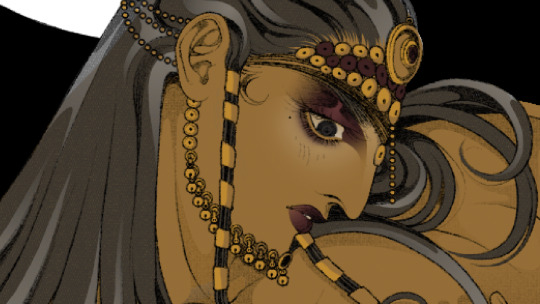
I can't survive this
#help#ok no more wips until he's done sorry friends#except maybe of the deflated squishy dragon#he's too handsome and I am going to perish#suleiman#i gave him my autistic puzzle solving trait#he bonds with the jester over puzzles and GAMES THEY HAVE A NURTURING RELATIONSHIP#when you play mind games with a king's knight of enemy kingdom and it makes him develop a crush on you - a silly little jester
457 notes
·
View notes
Text

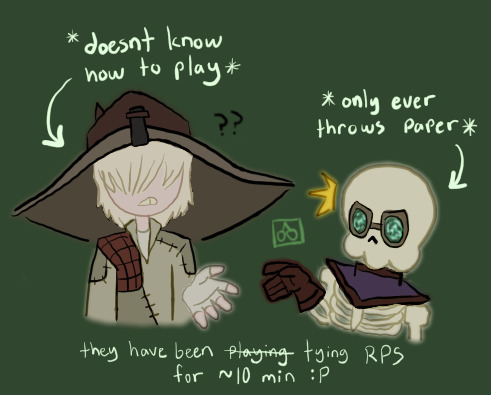

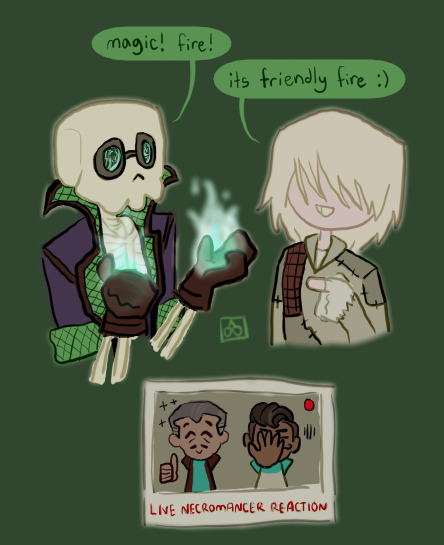
everybody was very nice on my last post(s) so !!! more cole and manfred be upon you :D
#my arts#dragon age#dragon age veilguard#dragon age the veilguard#dav#datv#da4#dragon age 4#veilguard#the veilguard#manfred dragon age#cole dragon age#dragon age manfred#dragon age cole#manfred the skeleton#cole the spirit of compassion#dragon age veilguard spoilers#emmrich volkarin#dorian pavus#EHHHH TECHNICALLY#not tagging solas or the iron bull tho. that feels cheaty#im still not very good at drawing skeletons (can you tell i was experimenting w his head lol) so take that as u will#but i loooooove doodling cole esp his hair <3 wet cat core. he used to be on so many of my school notes back in the day :]#i think i am going to draw them w some weird friends next (basically. sandal and kieran. cryptic boys my beloveds) but we will see !#also maybe something w varric bc uhhh. yeah >_>;;;#its crazy bc i know like 10 things that happen in veilguard and thats it. but fck it we ball >:3c#oh i also had an AU idea too UGH i have so much i wanna draw but ill stop#thanks for looking at my art and also i love you <33
994 notes
·
View notes
Text


i'm back!
ok so 2/3 days ago i found this youtube video where op turned Springtrap (or well, William Afton) into a fully build DnD character, and if i say so myself: things got out of hand fast
so here is my take on DnD Springtrap and specifically on that build (adding more infos under the cut for who is interested, i suggest to watch the video first)
starting with saying that unless you're playing in a scifi setting, this build is either not for you or to be modified, since in later levels spells are heavily centered around technomagic and electronic devices; personally when i will play him i will probably tinker around with the chosen spells and cantrips to make him less violently niche and/or more versatile
which kinda saddens me because it takes away not little of the characterization but, given most dnd stories take place in a medieval fantasy or high fantasy setting, a cantrip like On/Off or a spell like Remote Access are NOT particularly useful; so i will go for more psychic damage or necromancy oriented abilities, maybe i might take more than just 4 levels in artificier as well (especially given that again, all of those warlock spells at later levels are all technology oriented) but i need to see what those offer
however it is a kinda tank-y build given that with a shield on you can get up to a 27 of Ac, so even with low damage and not much hp you would not struggle too much to stay alive, and i like that!
as for the character himself, i put too much effort into my interpretation not to share it, so if anyone wants to play this guy as well, i fabricated a possible backstory that might come useful:
The character goes by the name "Dave Miller" (or whatever variant you want to use), and was originally a human artificier who created constructs for a living, mainly with the goal of offering aid to who needed it for whatever reason.
There however he ran into an issue, that being that a robot need a power source, and his own heart and lungs could not sustain a whole robot by themselves.
After losing part of his family to some kind of accident he became terrified of death, so with age he started replacing his own body parts with machinery to delay his last days (which made him a cyborg), until the point where he was very very close to become just a robot.
(This part may or may not involve a pact with a deity of death, this entirely depends on how you want to play him but it would make sense since the build is an artificier/warlock hybrid)
Through particular and very much not illegal experiments tied to necromancy he discovered that the life force of a living being could be shared, and used as a form of fuel. (possibly: age lived of the creature used= amount of extra months you get)
Here comes the second problem: this only worked with intelligent creatures, and more specifically, it worked best with creatures of your own race, which meant that he either went around murdering people or he found another solution. Non same-race creatures worked as well but not as good and there were not easy to find in the middle of a city and with a shop tied to your name.
And here is where and WHY he'd join a party of adventurers: after some time, his reserves or fuel were running VERY thin, and running into a group of adventurers was a god sent because by joining their party he essentially got a free pass to kill whoever he wanted, and reduce them to a dried raisin after sucking some life force out of them. Doing so you learn that the mowe powerful the creature is, the more energy it produces as well.
Your goal, that you as the player are following, when role-ing your character? essentially slay whatever powerful BBEG your Dm throws at you and suck all of that juicy fuel out of them, so that you can return to your little shop in the middle of the capital and return to create and sell whatever weird construct, doll, or robot comes to your mind for another few decades undisturbed.
And this is it. I think this might be a good backstory that could fit pretty much any setting you want to play this guy into, be it classic dnd or some scifi futuristic thing.
of course you don't NEED to use this one line per line, make up your own without looking back if you don't like it lol, dnd is the "make up shit and have fun" game after all!
Edit: also no his outfit makes no sense, i just went with vibes and decided a tanktop dress shirt, a twin tailed gilet and suspenders OVER said gilet was a good choice.
#not an ask#my art#illustration#fnaf#artist on tumblr#illustrtation#fnaf 3#fnaf 3 springtrap#springtrap#fnaf fanart#purple guy#fivenightsatfreddysfanart#william afton#fnaf 3 fanart#how many fucking tags there are about this guy jfc#dnd#dnd character#dnd art#dungeons and dragons#dnd charcter art#dnd artificer#dnd warlock#you have no idea what that video has done to me#i am not sane i am not normal#especially not about this guy#he was my first husbando and i am not ashamed of saying it#in retrospect maybe i should have taken the hint that i was into weird fucks lol#five nights at freddy's#IGNORE THE WRITING AT THE TOP OF THE FIRST IMAGE#that's from a graph i made to explain a friend when/if i use the robocock/robopussy when i draw/write robot smut
471 notes
·
View notes
Text

Sabran and the White Wyrm - from The Priory of the Orange Tree.
#the priory of the orange tree#tpotot#queen sabran#samantha shannon#sabran#just pretend this dragon is this small#in the book it is so much bigger#but i wanted to draw them like this#so bleh#my art#if you have read the book then maybe this means sometghing else#if you havent read the book then dont worry amd ignore that tag#i just remember they have the same colour eyes#when you find out that the witch of the woods is *redacted*#that was ny thought process here#so maybe i am lying about this woman with the green eyes#but WHICH woman with the green eyes? 👀
3K notes
·
View notes
Text

Little Dragon's Strong Arm
#am i done? i think i'm done. for the time being at least.#tempted to tweak the colouring a little but then again. i'm over looking at those textures and the absolute mess i've made of all 6 psds#maybe will come back to it if i manage to gift them with some footwear (or if i bribe someone to do it for me) who knows#lady's screencaps#lady's DA4 caps#taash#taash dragon age#dragon age the veilguard#gamingphotography#modding [am ded]#i really like their default palette okay 😌
231 notes
·
View notes
Text
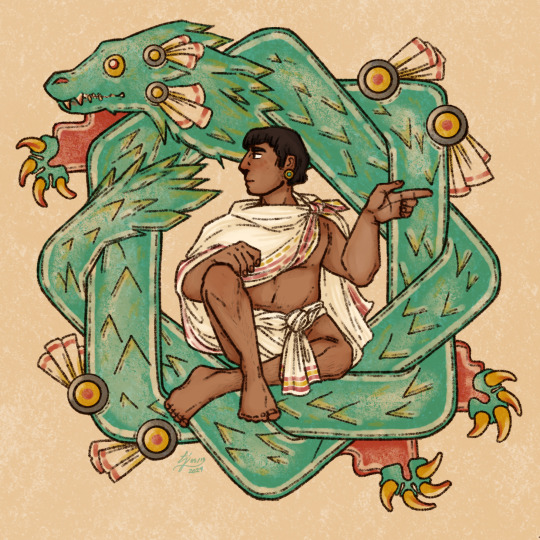
c. 1540 CE: a young man from Chalco, and his dragon.
#em draws stuff#em is posting about temeraire#temeraire#temeraire worldbuilding collection#⚬⚬⚬⚬⚬𐂂#<- tag for organizing when I'm drawing stuff that is temeraireVerse but not in the line of the plot of the books themselves#for school reasons I have been reading a lot about 14th-17th century mesoamerica#and thus am Interested in how that would have potentially played out in temeraireverse...#anyway! not sure if I'll draw these two again but I Have given the lad a day sign name (five deer) so I could Potentially. who can say.#haven't come up with a name for the dragon yet... maybe cipachcoatzin would work if can't think of anything else#<- Please Forgive My Dubious Command of Classical Nahuatl Grammar I Am But A Student#on that note zoomorphic interlace is not very much a style from this period/region but it helps me with composition things#five deer himself is mostly based on the illustration of the tlacuilo's son in the codex mendoza#the dragon is drawn more from a fusion of older scribal styles (ie. the codex borgia) and my own shorthands for dragon anatomy
1K notes
·
View notes
Text
Some facts about Taash (and also the Lords of Fortune, the Qunari, Dragons and other related things) gathered from the banters
Featuring Shathaan's stories about the Crows!
I went through all companion banters on DanaDuchy's channel after playing the game to write down all facts about companions/the world that I haven't seen brought up anywhere in the game as a writing reference (and for funsies).
Note: This list may not be exhaustive. I might have missed some something or didn't write it down because I considered it common knowledge. If you have anything to add, please DM me or send an ask! (do specify what banter the information is coming from, though)
Note 2: Posts from this series (mostly) don't include information from banters specific to quests or between companions and faction members. I plan to do another playthrough to capture more of those and will add any relevant info to the character posts.
Other characters' posts: Bellara, Davrin, Harding, Lucanis, Emmrich, Neve. I'm also planning a post about just the Lighthouse some time later
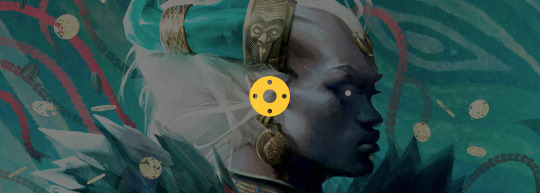
About Taash
General:
Taash gets grumpy if they stay inside for too long
Taash may polish their treasure hoard or clean the dishes (even somebody else's) to get out of their head
When Taash is feeling sad, they ask somebody else about how they are doing, so they can focus on somebody else instead of themselves
Taash doesn’t like talking about their feelings because it makes them sad (Lucanis can relate)
Taash doesn't read books before bed because they have a tendency to stay up past their bedtime to finish the exciting parts
Taash seems to care quite a lot about fibre and digestive health (they are so real for that). For example, they enjoy the smell of coffee but don’t drink it because it’s bad for their guts
Taash drinks alcohol
Taash once requested Bellara/Lucanis to cook them a demon (the suggestion was disregarded)
Taash liked Lucanis’s deep-fried peppers
Taash liked Bellara’s stir-fry
(If Rook is in romance with Taash) A spirit of devotion appears next to Taash after they enter a relationship
Taash doesn’t want to look for more dragonfire tablets because “they are just more orders”, and they already have enough
Taash doesn’t kill in cold blood and needs to get angry in order to kill someone
Taash has good taste in gemstones, knowing which colours match which (based on the banters where they recommend gemstones for Emmrich’s lich helmet). They say it’s a Lord of Fortune thing, they have to know how to make gems look good
Taash isn’t afraid of the Fade, because the spirits there mind their own business and don’t try to possess anyone (or anything)
Taash thinks that even if the Nevarrans almost brought their dragons to extinction, they will still come back eventually
Taash is extremely excited to hear that Morrigan can (potentially) turn into a dragon and wants to ask her about it next time they meet
Taash doesn’t mind finding no loot when hunting dragons because as long as you survived an encounter with a dragon, you have a new story to tell
Taash doesn't think of dragons as monsters since they are a natural part of the world and have been around longer than anyone else
On fire-breathing:
Taash started breathing fire when they were a toddler
Taash needs to eat greens after breathing fire, or they get headaches
According to healers, fire breathing hurts Taash’s lungs
Taash accidentally set their first female partner’s hair on fire during their first sex
Taash once tried to cook with their dragon breath and accidentally melted a pot and set the kitchen on fire
On Taash’s sense of smell:
Taash got their heightened sense of smell after they got sick and couldn't breathe through the nose for a couple of months. After they recovered they could suddenly smell everything
Tassh can smell when someone is ovulating. They can also smell who had been in the room before them, and who is hungover
Taash could also tell Neve got together with Rook or Lucanis from the smell even before anybody told them
To Taash, Minrathous smells rainy and ‘like rich people hurting poor people’
Early life and the relationship with Shathann:
Taash learnt to swim before they learnt to walk
Shathann sometimes wouldn't let Taash play/go swimming until they finished their studies (like being able to tell the difference between some pottery shards)
Shathann gifted Taash axes during one of the gift-giving holidays when they were younger. They were simple kindling choppers, but Shathann helped decorate them to make them look like Qunari weapons. During a conversation with Bellara, Taash realises that may be the reason they are still using axes to this day
Axes are also good at lodging between dragon scales and allows them to climb up
Taash grew up poor, though they didn’t realise it because Shathann always made sure they had enough food, even at her expense (like pretending she didn’t want to eat because “Rivaini food is too rich for her”)
Taash spent the money they made from their first job as Lord of Fortune on buying Shathaan a dress. Shathann didn’t appreciate it, instead urging Taash to buy themselves boots or some other useful things
Shathann hated apples because their skin would get stuck in her teeth (“Evataash, that fruit is stupid!”)
If Taash chooses to pursue Rivaini culture and wear Shathann’s horn as jewellery, they have a blacksmith do runes in the old Qunari language along the edges and get a Seer to bless it
Shathann stopped telling stories about the Crows after Taash once climbed on the roof to play as a Crow
The things Shathann taught Taash about the Crows:
Antivan Crows make themselves invisible to dragons by imitating the dragon's shadow
Antivan Crows coat the beaks of actual crows with poison so that the crows can kill people by pecking
Antivan Crows can slow down their breathing until they become invisible
Antivan Crows come through houses at night and kill children who aren’t in bed
Antivan Crows can do a special move that stops their enemy's heart
Antivan Crows can strangle a Qunari with their own dar-saam (but only if it’s tied incorrectly)
Relationships with companions:
Bellara gives Taash advice on cooking dinner for their mother
Davrin teaches Taash to use buckets filled with water and sand for lifting
Taash has never flown a kite before and asks Harding to teach them
Harding's mother sends Taash a letter with homemade candies after Shathann’s death, calling it “a hug from afar” (Taash appreciated the gesture and liked the candy)
(If Rook is in romance with Taash) Taash asks Lucanis about what Rook likes to eat, and Lucanis offers to teach them how to make coffee/tea/chiocolata calda
Taash isn’t scared of Spite, and even convinces (or more like intimidates) him not to talk about how other people smell without their permission
Lucanis agrees to teach Taash how to kill targets with flair (with varying degrees of success when it comes to cool one-liners) and then plans to ask Teia to make a Crow cape just for them (Taash is very excited about it, as they love crow capes)
Taash insists Neve should get some trophy from Aelia (a ring, or an amulet with her name) to show everyone she beat her, and doesn’t understand why Neve isn’t interested in something like that
Taash offers their blood to Neve for blood magic purposes (Neve doesn’t take up the offer)
Taash thinks Neve’s ‘dresses’ are pretty
Taash thinks nobody can go toe-to-toe in magic with Neve
Taash offers to hook Neve up with their jeweller to get her a discount (in case she wants a new leg) because “Neve deserves nice things”
Lords of Fortune:
Lords of Fortune have a drunk game where they throw a goblet made from fool’s gold into the water for others to find. Whoever finds it gets free drinks for the rest of the night. The game has only one rule: no punching in the junk
There is also another drunk game where drunk Lords jump off a giant cliff. The only rule is not to hit the water face-first
Even if those are “drunk games”, you can participate in them sober, as long as you are willing to be as stupid as the drunk people
The Lords of Fortune pick new jobs by Isabela throwing daggers at a map or racing nugs (the winner picks the job - could be its owner, or the nug itself)
The lords used to blindfold Mateo (the faction merchant) and spin him around in circles until he tripped on something like a map. They stopped doing that because a Seer told them to quit (the whole thing gave Mateo headaches)
After Shathann is gone, Taash is in charge of appraising Qunari artifacts for the Lords until they find a better expert
The Lords of Fortune work with a Dalish clan keeper Shivanas (Taash calls them ‘Shiv’) who appraises artefacts for them (tells them what’s okay to sell and not to sell etc.)
After losing his hand, a Lord named Bernst got a lock-pick hand prosthetic decorated with gems
About Dragons:
Different breeds of dragons can mate and produce offspring. That’s how ice- and lightning-breathing dragons came about
The muscles of dragon wings’ are vulnerable behind. Another weakness is the underbelly
Fighting Dragons is all about making them come to you, either by having them see you as a threat (so they come down to assert dominance) or prey (so they come down to eat you)
There is a dragon called Wildervale Spitter, which can breathe fire or poison gas. The “fire breath” is actually just poison that burns when the dragon breathes. Most dragons always ignite their breath. The Spitter's special for being able to choose whether to light it up.
Dragons have an extra eyelid that they shut while breathing fire in order to protect their eyes
About Qunari etc.:
Eb-ketarra means something like “growing memories.” When you graft someone’s horn onto yours, you also add their strength to yourself
Qunari food uses a lot of oil for frying
Qunari have a much better sense of smell than humans
Qunari can bury their dead with large jars inlaid with a flame pattern. It’s called ‘issalatar’ and is empty inside, representing that the deceased’s body is also empty now that their spirit is gone
The Rivaini armada can hold its own against the Antaam fleet, but only in good weather. They can’t match the Antaam in firepower, but they can outsail them
Isabela is apparently still a captain of the Siren’s Call
#probably a bit late in saying this but if you are interested in where a specific piece of information is coming from feel free to ask#I more or less remember where all facts in all posts came from#when I started taking these notes I never would have thought Taash's would end up the longest#that's how you know that personal bias wasn't involved because if it was we would have a 3k-word Bellara post on our hands but here we are#well taash is my second favourite. *maybe* the biases were involved#also probably has something to do with the fact I started taking more and more notes as time went on#and I listened to Taash's banters last#well I am planning to make revisions to the posts when I play the game again (very soon TM) so maybe the others will catch up#and thank you so much to everyone who reblogged and said something nice in the tags every single one of them means the world to me <3#dragon age#dragon age the veilguard#veilguard spoilers#taash#lace harding#neve gallus#meta#references#flowers.txt#Shathann#lords of fortune#datv banters#flowers blogs
214 notes
·
View notes
Text
It is no hardship, Emmrich tells himself, to wear his face. It is his, after all. The one he was born with, the one that grew and shifted under his own patient gaze, seen in puddles, in mirrors, in the glass of a carriage window as he smoothed down his hair with the flat of his palm. A face he had stared at for far too long that first time he shaved, and again a few years later when he invited that very pretty boy out for a promenade and wanted, with all the force of a young man’s vanity, to be just as pretty himself—no hair astray, the kohl at his lower lids an almost imperceptible shadow, the perfume at his neck a whisper of carelessness, though in truth, nothing had ever been more deliberate.
For a decade now, they have called him distinguished. Before that, they called him handsome. He knows his face, likes his face. Its summoning should be no trouble at all; especially now, especially like this, stripped down to something more elemental, all ivory angles and nothing more. But Rook is uneasy. She does not say so—she is all sorry, shit, don’t mind me, fuck, fuck, I’ll get used to it, I’ll get used to it—but she is not made for the sight of bone in the dark when she wakes abruptly. He has had years to come to terms with the unmaking of his flesh. She has not.
So he does not miss his face, not really. But Rook does. And for Rook, he will pretend.
No, he tells himself again, he does not mind. He does not.
Lichdom, as he had once explained to her, sanded down most of his senses. Blunted them, rubbed them smooth. But in their place, others have surfaced. Senses without names, without proper edges, ones that slip through language like smoke through a cracked door. He cannot smell the perfume she wears, though he knows it is dreadful, some sticky, saccharine thing she bought in Treviso with Lucanis and spilled all over her shirt. But he can see her pleasure when she presses a little figurine into his palm, triumphant and insistent. This one, she affirms, is so much prettier than the first, and most importantly, not haunted.
He watches her giddiness churn inside her, thick and writhing. It is purple, inexplicably. It loops and knots, wriggling sideways, swelling through her veins, a restless thing. It coils, slippery, around her heart before pouring from her mouth when she speaks. When she presses her lips to what passes for his cheek, he thinks he can taste it. Or something like tasting. As if she had chewed it to a pulp, crushed it between her molars, worked it down to something fibrous and wet and pressed it into him, like carrion slipped between teeth, offered as a gift.
He swallows it, slow.
Perhaps this is what purple has always tasted like.
There are other things. Other feelings. They arrive misshapen, crawling over the edges of his thoughts, curious, pestering, impossible to ignore. They perplex him. They amuse him. And sometimes—sometimes—he wishes he felt nothing at all.
Like when she cuts herself, and he watches the blood spill, a slow, indifferent line along the curve of her arm. But it is not blood, not in the dull, medical sense. Not something as pedestrian as iron and salt. It is a ribbon, impossibly red, and he can see the rest of it coiled inside her, packed neatly away, waiting to be tugged. How much could he pull free before she wavers, before her lips lose their color, before the bright, stubborn thing inside her gutters out?
He heals her arm. Does not look at her when he does it. Says nothing of consequence.
But he wants to take that ribbon and wind it around her wrist, knot it, twist it, pull it so tight that it ceases to be a ribbon at all. Flesh yielding to pressure, pressure forcing permanence. A bracelet of skin. A smooth, bloodless seam. A correction.
Rook thanks him. A glance, a nod—already half-gone as she turns toward Rivain. There are things to be done there for her, and he cannot stray from the Necropolis for long. What things, exactly, she does not say, but he knows their shape well enough: dragons, impulse, the peculiar magnetism of disaster. She has always been like this, drawn to the spectacularly unwise with the certainty of a moth misjudging distance.
He can no longer follow.
She will return. He knows this. And yet, if his hands still possessed the capacity for tremor, he suspects they would betray him now.
"I love you, I love you, I love you," she sings, a careless, looping refrain, a child’s chant repurposed for a woman who has never quite learned to tread lightly. She chatters as she moves; this and that, something or other, a bad decision or three. She shows him rings, delicate and stolen, lifted from a dragon’s hoard, then tells him of a strange mug found in the same place and promptly lost to someone forgettable in a game of cards.
"Look, look," she says, because excitement makes her redundant. "I kept these for you."
The rings slide onto his fingers—bandaged, skeletal, indifferent to the distinction. He flexes them. Smiles, because each one carries an emerald, and green has always pleased him.
"I was meaning to ask you," Rook says. She is still holding his hand, turning it gently in her own, left, right, right, left, as though testing whether it is truly there. "You are smiling now."
"I am."
"Don’t interrupt me."
"My deepest apologies."
"It was a joke," she says, but absently, without weight. Then, again, softer: "You are smiling now. But is it real? Or do I see a smile only because I expect to? Because I believe it should be there?"
"It is quite real," he reassures her, lifting his free hand, brushing two fingers against her cheek. "The glamour does not fabricate emotions. It is a projection, not an invention. A polished pane of glass through which I am seen, rather than a mask obscuring what lies beneath. It filters nothing. It simply allows you to perceive what is still there, as it was."
She exhales. He watches it unfurl from her mouth, a slip of breath that curls, dissipates, wrapped in green. Relief, perhaps.
"Good," she murmurs. "That is good."
There are things he misses more than others. Some he had not expected to mourn, believing that lichdom would cauterize the want before it could take shape. And perhaps it would have, if not for Rook. But she exists, unavoidably, and so the loss takes shape, outlines itself, defines itself against the hollow places she touches.
The intimacy of the body: its mechanics, its heat, its crude and glorious simplicity. He misses the way skin clings, damp and sticky, the tack of sweat drying between them. The way lips grow chapped from too much kissing, saliva sapped away until the skin cracks, until the next kiss stings. He misses the raw and graceless rhythm of it, the press of her thighs around him, the slow loss of self in the churn of it all. He misses the way he could press his palm to her stomach, still sheathed within her, and feel himself there, caged by her.
And afterward, in the languid sprawl of spent nerves and loose limbs, the way his mind would wander, taking him by the hand, showing him its little fantasies, its secreted-away indulgences—let us get married, Rook, I will buy you so much gold, let’s get married, yes, and then let’s have a child, but not immediately, not at once, let’s linger here a while, let’s lose ourselves in this, let’s glut ourselves on one another until we are utterly ruined by it, and then, yes, then, we will have that little thing.
Now, he feels her differently. Not through skin but through something more fundamental, a closeness that eclipses anything flesh ever allowed. It is fuller, sharper, deeper than anything he could have imagined.
But it is not the same.
And he does not yet know if he prefers it.
Time, as always, will decide.
Pleasure has not abandoned him. It has only changed its nature, its source, its means of arrival. Now, it exists solely through her. He sees, now, how men dissolve into drink, into smoke, into whatever tincture delivers them to sensation. The body remembers its peaks; the body conspires to reach them again.
"Will you come for me, darling girl?" he murmurs against her ear, his fingers curling inside her as they have done so many times before—when his hands were warm, when they ceased to be.
And she does what she always does: she writhes, she gasps, she laughs, she moves against him with the helpless, thoughtless grace of something yielding to gravity. Her hips chase the friction, her mouth parts, her breath hitches, her lashes lower, heavy with pleasure. And he—he is there inside her, feeling it as she feels it, tasting it in a way that has nothing to do with taste, swallowing it down, letting it course through him. It is vast. It is staggering. Pleasure enough for two, for more than two, enough to fill the space where he no longer exists.
Afterward, she is breathless, boneless, staring up at the ceiling and laughing that strange, impossible laugh. He no longer tries to make sense of it. Some things cannot be translated. She has a laugh for anger, a laugh for excitement, a laugh for surprise. He thinks he knows this one well enough by now, the one that trickles out of her in the aftermath.
A trick, an echo, the imitation of a thing once real. He kisses her where he would have kissed her once—her mouth, the sharp ridge of her collarbone, the small curve of her breast, except now there is no heat, no wet drag of a tongue, no parted lips. Only the careful architecture of a spell, a memory sculpted into sensation, something just close enough to pass for real. He trails lower, following the old pathways, the ones his hands remember even if they are no longer the same.
She sighs. Again. Again. Another time.
He lingers where she yields the most, where she is all pulse and warmth, where her thighs, slick and trembling, part for him before he even touches her. Where breath quickens and thought slips away. And through it, he drinks. Draws from her as he always does, as he must, in ways he does not fully understand, or perhaps does, but has decided against understanding. He takes until she is weightless, drifting, until her voice emerges in that low, drowsy enough, enough, until she exhales, unconscious of herself, shifting, turning into him, her cheek settling against his shoulder, her body already gone to sleep.
And he wonders—if he did not stop, could he empty her?
What is it that they share, exactly? What does she give? What does he take? Is it taking at all? Perhaps she is feeding from him just as he feeds from her.
He could ask. He could go looking for the answer. It is what he has done his entire life.
But he does not. Because the answer, whatever it may be, does not matter. Because, at his core, he knows this much to be true:
He is an empty thing now.
And all empty things must be filled.
It is a dreadful experience, watching her get hurt. Dreadful in its predictability, in the casual inevitability of it. Rook, as he has come to understand, is the sort of person who leaps from a cliff first and wonders, mid-air, whether there was perhaps a gentler way down.
He saw it in Hossberg—how she, in some fit of blind fury over a slight he can no longer remember, kicked a blight boil with all the grace of a petulant child, only for the thing to rupture, spraying its filth over her boots, her legs, her hands, her face. Later, when he spat out his anger—you could have infected yourself, and then what? Where would the Veilguard be without their leader?—she had, without hesitation, lifted her middle finger and held it aloft, like a banner, like a flag planted firmly into the dirt, a gesture so profoundly Rook that it settled the argument before it could begin.
She returns from Rivain with a sprained wrist and, predictably, does not acknowledge it until he gestures toward it, a quiet inquiry rather than an accusation.
So he buys her things. Things with weight, with shimmer, with the ability to distract. A bottle of wine she favors, a dress the precise shade of blue that once made her pause in front of a shop window, jewelry that catches light and throws it back in a thousand fractured directions. Loud things, bright things, expensive things. The kind of things a magpie would die over. Because Rook—misnamed, mislabeled—is no rook at all, no solemn, shrewd thing perching in the rafters. She is a magpie, ever in pursuit of the next gleaming fragment, the brightest piece of a broken world. That is why she is away, isn’t it? Always away. Always chasing.
But Nevarra has more gold than the Rivaini coast.
He wants to say—won’t you stay? Won’t you, at last, stay longer? But there is something perilous in the asking. The wrong phrasing, the wrong weight to his voice, and she will fold up like a map, unreadable, distant, already turning toward the door.
She lifts a necklace, lets it spill through her fingers, a thin chain pooling in her palm. "Ooooh," she hums. "What’s the occasion?"
"I have missed you terribly," he says. "You were away too long."
"I missed you too."
"Then stay. My townhouse is yours, of course. It is in the heart of the city—"
"But you won’t be there," she interrupts, without sharpness, without accusation. A simple statement of fact. "You’ll be in the Necropolis."
"Then stay with me in the Necropolis," he says, more softly.
She looks at him. Long enough for him to grow aware of the silence. Long enough for him to think he ought to say something more, to fill the space with some innocuous remark, something to break the weight of it—a comment on the weather, the slow drip of rain against the windowpanes, the scent of damp stone, the candlelight shifting across her cheek, the peeling corner of the wallpaper he has been meaning to mend but never does.
Then, at last, in a whisper, as if she is considering each word before releasing it:
"I'm trying."
A breath.
"I'm really, really trying. I love you so much. This frightens me, but I love you, and I'll stay longer, I promise, and you needn’t hide your face, no, no, you can stop hiding it now, but it is so terribly cold here, and I can smell the bones, Emmrich, did you know one can smell bones?"
Senseless, rambling little words, leaving her mouth with no regard for order, no real expectation of being understood. He listens anyway. He nods as if these words, specifically, are the ones he has been waiting to hear. He holds her hands, pressing his fingers lightly over hers, as though reacquainting himself with the shape of them, the bones beneath the skin. And this time—this time—she stays.
He does not move. Does not speak. Instead, he lets the moment settle around him, lets it press in from all sides, cautious and weightless, as if sudden motion might send it scattering. A trick of the mind, surely, nothing more than habit, the vestigial longing of a body that no longer exists. And yet—something, something faint and absurd and wholly impossible—something like warmth uncoils in the vacant spaces of him, and for the first time in too long, he allows himself to believe in the illusion.
And he is happy, so terribly, foolishly happy, until she steps where a step should have been, onto stone that no longer exists, because the Necropolis, fickle and treacherous as ever, decides to shift beneath her. One moment she is there, cursing the cold, flicking dust from her sleeve, and the next she is gone, swallowed into the dark, falling before he can reach for her. Then—impact, the sound of something snapping, something that should not snap.
"Oh, for fuck’s sake," she spits, voice sharp with pain, her frustration seething through clenched teeth. "I hate this fucking place. This miserable, shifting, plague-ridden, necrophiliac fucking mausoleum. This—" she swallows, gasps, rage momentarily overtaken by the white-hot shock of agony, then forces the words out, savage and breathless—"this godsdamned, dusty, corpse-stinking labyrinth of a tomb. Fuck this place. Fuck you for living in it. Fuck this floor for moving. Fuck my fucking leg."
She hisses even as she cries, squeezing her eyes shut as if trying to will the hurt out of her body. He sees, at last, what has happened. A break, and not a clean one: bone slick and white against torn skin, jutting through muscle, her blood already thickening where it pools on the stone.
And then—something strange. A pull, an unraveling, something unwinding before him, leading away. The ribbon again, unspooling, slipping from her, stretching outward, as though guiding him somewhere he does not wish to go. His vision narrows. He follows it. He follows it because he cannot help but follow it.
"Emmrich?" Her voice has changed. The heat is gone, as is the anger. She sounds uncertain now. She sounds concerned. "Emmrich, are you—?"
But he is looking at the ribbon. Watching where it leads. Watching where it ends.
And he would weep if he could.
He has spent his life in a state of want, always reaching, always grasping, always aching to be something necessary to someone. And now—now, at last—he has what he has longed for. Rook, quick and wild and untouchable. Rook, who was born lovely and careless and beautiful, who could have wrapped herself around anyone she pleased but chose, instead, him—old and grey, and then, simply, bone. Rook, with her hands always outstretched, her eyes always searching, who once told him, so offhandedly he almost believed she didn’t mean it, that she would have given him a child.
Now—now, she sits before him, cursing under her breath, her leg twisted, her blood sliding across the stone, and he understands, too suddenly, too clearly, that he cannot keep her.
One day, that ribbon will slip from her entirely.
And he will be wanting again, except this time, there will be no remedy, no second chance, no indulgence to dull the ache.
Because she—she—the only thing that has ever fit the hollow inside him, will be gone.
A year. Ten. Twenty. Perhaps less. Perhaps more.
She will be gone.
Gone, gone, gone.
"It will not break again," he tells her.
"Really?" she asks, pale from hurt.
"Truly."
He stands, glances over the chamber, and selects a sconce, its veilfire guttering weakly within its iron frame. He snuffs it out with a flick of his wrist, wrenches the metal free from the wall, and lets it sag into liquid in his palm. The Necropolis will not miss it. It devours offerings every day; what is one more? The molten iron shifts, pulses, rolls like living mercury as he shapes it between his fingers. She watches, suspicious, wary, but when he takes the pain from her, she sighs, slackens, her body a thing that yields, a thing that trusts.
Bone is simple. A structure, a framework. Break it, mend it, break it again. He has done this before, he will do it again, and the body always obeys in the end. With a slow push, he sets her leg back into place. Crack, crack, crack—shattered edges realign, splinters withdraw, raw ends fuse like wax pressed to wax. He sees the place where the bone has chewed its way free, white and wet against the torn meat of her calf.
He presses his fingers into the wound, past the sealing skin. The iron above them stirs at his will, stretching like a cat in the air before obeying, flowing down, clinging to the surface of the bone. Not inside it, no. That would be crude, inelegant. Instead, it forms a layer, thin but solid, a second skeleton over the first. It cools as it settles, solidifies, binds itself to her as if it had always belonged there. He guides it lower, shaping it over her tibia, letting it follow the curve of her ankle, turning his wrist slightly to direct it sideways, until the fibula is covered as well, safe beneath its new armor. There.
The final shreds of her wound pull themselves shut, sealing over his work, concealing what has been done.
She shifts her foot, tilting her head, considering. "Oh," she says. "I suppose I'll be heavier now."
He kisses her cheek and feels the faint shift of muscle beneath his lips, the small, secret curve of her smile. This time, for once, her happiness has no color. Not gold, not red, not that strange, shimmering violet he sometimes sees curling from her ribs. Just happiness, unembellished, undisturbed. And because she feels it, he believes it, and because he believes it, he takes it for himself, drawing her close.
"I am so, so happy that you are safe," he hears himself say, a confession with no real shape, a drunken speech without the mercy of intoxication. "I worry when you are gone, and I worry when you are here. It seems that no matter what I do, something always finds you first."
She hums, arms looping around him, her fingers idly mapping the planes of his back, tracing aimless patterns into the fabric of his robes. "I don’t know what to say to that," she admits, her voice softened by exhaustion, by the slow retreat of pain. "But I am so, so happy with you too. And it’s all right, it’s all right. Every time I break, you can repair me." She pauses, then adds, utterly deadpan, "Guess that makes you my skele-tonic."
It is an objectively terrible pun.
"Until you stop breaking altogether," he murmurs.
Another hum, vague, thoughtless.
He draws from her as he always does: pleasure, warmth, something deeper, something without a name, though it must have one, must have been cataloged somewhere, written down by some scholar who spent his life studying things that could not be grasped. He has never fully understood what it is he takes, only that it belongs to her, and that, by some quiet, unspoken permission, it is his as well. He wants to love her forever. But more than that, he wants to ensure that forever remains within reach, that it does not remain, as so many things have, just outside his grasp, dissolving the moment he closes his fist.
He has spent too long watching what he yearned for unravel before he could fasten it down. This, he will not allow. It will take gold, it will take iron, it will take something far stronger, something absolute. Until she ceases to break. Until breaking is no longer a possibility, a concept, a word that has anything to do with her.
He does not yet know how. But he has time—too much of it. More than she does. And he has always been a man of precision, of hypothesis and proof, of elegant solutions to insufferable problems. He will find a way. Through metal or magic, through that ribbon of red that keeps slipping from her, unspooling itself in slow increments, always trying to get away. He will take it, force it back into place, stitch it to the marrow, fix it with something incorruptible, something permanent, something that cannot be unwound without unmaking her in the process.
He presses a kiss to her temple, then to her forehead, and speaks of flowers. The new blooms in the Memorial Gardens. Hideous, by all accounts. She will adore them. She appreciates beauty, certainly, but she loves foolishness even more. He kisses her cheek, the tip of her nose, her small, stubborn chin, and feels it again—that bright, quiet thing. Happiness.
And, miraculously, when he takes a piece for himself, it does not feel stolen.
"Enough, enough," she murmurs at last, the same word twice, as she always does when she needs a break from him, when she has given too much, when she feels him pulling, drinking, taking in excess without meaning to. Laughter ghosts beneath the words, thin but present, a reminder that she is still here, still whole. She taps his wrist with two fingers, light, quick, final—a gesture that, for all its carelessness, feels uncannily like closing a book.
#i can't sleep so i quickly edited this thing i wrote a while back so it's not as raw and am now throwing it out into the depths of tumblr#we don't condone lichdom in this house#there is no way emmrich would remain a sane human being as a lich if he romanced rook#frankly they should have given us the option to break up with him if he decided to go full lich#he is only gonna transfer his fear of death onto rook#and it will not be healthy#it will be weird and uncomfortable and maybe downright creepy#aight im gonna try to sleep now#emmrich volkarin#emmrich x rook#emmrook#rook x emmrich#lich emmrich#dragon age the veilguard#datv#shortstories#my stupid writing#< those last two are just my personal tags for finding my own shit if i need it btw lol ignore them
286 notes
·
View notes
Text




[ID: four pictures of the darkspawn from dragon age: origins, dragon age ii, dragon age: inquisition, and dragon age: veilguard. End ID.]
(i could not find a better picture for the dai darkspawn, sorry)
#da#01#promise i am not complaining about the vg darkspawn again i just wodner if my view is skewed.#maybe the vg design is better at what its trying to accomplish and i am just wrong.#dragon age#no matter what i will shut up abt it after this though (< what i said the last time too lmao)#..........youll never be able to convince the red eyes arent goofy looking though#personally my ranking is origins > ii > vg > inq
151 notes
·
View notes
Text
so i think solas's lyrium dagger is the same "blade that would end the war" from merrill's fen'harel story in da2 btw
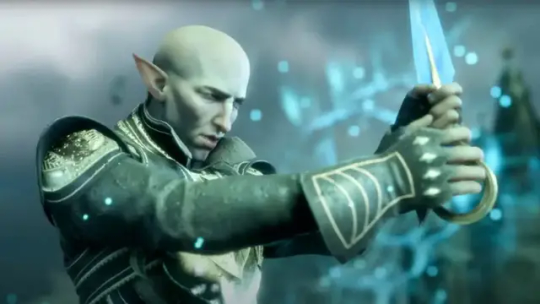

and sam winchester voice get this. we know the dagger was extracted from da2's red lyrium idol right. and likely purified during the ritual discussed in tevinter nights. which is interesting because "a glowing blue blade that has the capacity to resist or possibly even cure the blight"?? sounded incredibly familiar to me :) so with that i would like to also point out the similarities btwn solas's dagger and the sword maric theirin found in the deep roads from david gaider's 2009 tie-in novel the calling. lol


also worth noting that he and fiona banged shortly after he found this sword, and later, after the birth of alistair, she found out she had been effectively cured of the taint and had somehow reversed the calling. the only grey warden ever recorded to have done so.
#datv#dragon age#solas#DOTS. I AM CONNECTING THEM.#im praying on my hands and knees that the devs remember this book exist and DO smth w this connection bc this would be straight up crazy#the only difference between them is that maric's blade is described as glowing blue ''runes'' not the blade itself. and dragonbone obv#but its too much of a coincidence to be a coincidence !!! and those details are so minor i feel like they could be effectively retconned#or explained lol. i do think its possible there are maybe several blades/weapons that are similar and all connected possibly#but idk. my thoughts begin and end at this spot. i need to reread dread wolf take u in case ive missed anything#but yeah. BIG IF TRUE LOL
337 notes
·
View notes